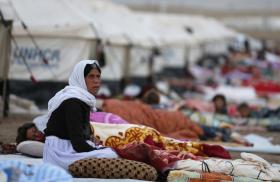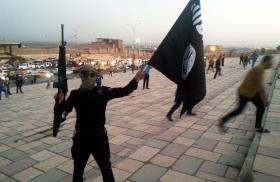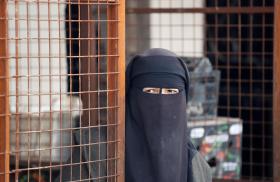Part of a series: Counterterrorism Lecture Series
or see Part 1: U.S. Efforts against Terrorism Financing: A View from the Private Sector
An update on the work and recommendations of the 9-11 Commission.
On September 12, 2007, Michael Hurley and Chris Kojm addressed a Policy Forum at The Washington Institute. Mr. Hurley, recently retired from twenty-five years of service at the CIA, served on the 9-11 Commission as a senior counsel and director of the counterterrorism policy investigation. Dr. Kojm, now a professor of international affairs at George Washington University's Elliott School, is former president of the Public Discourse Project and deputy director of the 9-11 Commission. The following is a rapporteur's summary of their remarks.
MICHAEL HURLEY
Six years after September 11, terrorist attacks still threaten Americans. Although Washington has carried out major reforms to improve its counterterrorism measures, there is a critical lack of urgency on several fronts. Three issues in particular stand out: the situation in Afghanistan and Pakistan; the threat of weapons of mass destruction (WMD); and the ever-present and ever-evolving al-Qaeda.
Although former defense secretary Donald Rumsfeld recently stated that Afghanistan was a success, his analysis is too optimistic and ignores the many warning signs. According to Afghan president Hamid Karzai, the security situation has deteriorated in the past two years. The Taliban is resurgent, the United States has still not captured Osama bin Laden, more suicide bombings are occurring, and there is increasing violence between coalition forces and insurgents. In addition, the United States faces a public image crisis because its military strikes have accidentally killed more than five hundred civilians in the past year alone. Afghanistan also produces 90 percent of the world's opium supply. The country is at the epicenter of terrorism, so it is essential that the United States achieve victory there or risk sending the message that terror is winning.
In September 2006, Islamabad agreed to remove its forces from the tribal areas in northern Pakistan if local chiefs assumed responsibility for security and the prevention of crossborder raids. The chiefs have not honored their agreement, however; since the deal, attacks originating from the Pakistani border have doubled. Militants continue their attacks on U.S. troops, teenagers have been recruited as suicide bombers, and al-Qaeda has succeeded in building a safe haven in northern Pakistan. These and other factors support the assessment given in a recent National Intelligence Estimate that President Musharraf's plan is not working. The United States will give Pakistan $750 million worth of aid money this year in an effort to reverse these disturbing trends, but it is unclear how Washington will oversee the spending of these funds. It is imperative that the United States focus on northern Pakistan as al-Qaeda's new base.
Although al-Qaeda has not yet attacked the West with WMD, there is evidence that the group still hopes to do so. After bin Laden obtained a Saudi cleric's justification for using a nuclear weapon against the West, al-Qaeda officials met with Pakistani nuclear scientist Abdul Qadir Khan about the possibility of buying such weapons. At this point it is more a question of when, not if, al-Qaeda will be armed with a nuclear device. The 9-11 Commission recommended that the United States prevent WMD from falling into terrorist hands. But Washington is not adequately safeguarding nuclear stockpiles or preventing al-Qaeda from recruiting weapons experts. Moreover, a 2007 Government Accountability Office report revealed that systems put in place to detect the entry of fissionable materials contains many flaws. A $1.2 billion program to remedy such problems has been delayed over technicalities.
Since September 11, al-Qaeda has changed considerably. Control is now decentralized, but the group's core is resilient. It is able to recruit many new members every year, especially through the estimated 5,500 websites worldwide urging violent jihad. Al-Qaeda has transformed both its organization and its membership by recruiting more women and members of the educated elite (e.g., doctors). This means that the West no longer has a workable profile of an al-Qaeda operative.
The United States is not adapting quickly enough to react to al-Qaeda's changing face. For example, the bulk of the U.S. defense budget goes to items such as aircraft carriers, which are not tactically useful in the war on terror. The United States should spend more on intelligence and programs that are aimed at reducing radicalization in the Middle East.
CHRIS KOJM
The United States has used and should continue to use military power to combat terrorism. But this is not enough -- the threat of terrorism is persistent and evolving. America's influence in the world depends on public image and how willing other nations are to cooperate with U.S. initiatives. To achieve security in the long term, the United States needs to improve its image in the world.
The best way to do so is through economic assistance. When Washington sent aid to Indonesia after the tsunami and to Pakistan after the earthquake, public support for the United States grew in both countries. U.S. reconstruction money spent on health, clean water, and aid programs does more to foster a positive image than a strong military presence.
Education is another good way to improve foreign relations. Bringing foreign students to the United States helps develop positive perceptions that they take back to their home countries. Many of these students often become future leaders, so they have the potential of being important future allies. Sending Americans to study abroad also helps improve the U.S. image because these students are able to interact with the local populations; in addition, it helps build a more informed American citizenry.
Another priority for the United States is the closing of detainment camps in Guantanamo Bay. Many countries see Guantanamo as a stain. But hopefully, that stain can be wiped clean if the camps are closed immediately. Finally, the United States needs to reconfirm its commitment to the Arab-Israeli peace process. In order for the peace process to succeed, it must involve the executive branch and reflect the genuine commitment of the United States to helping the parties find a workable agreement.
There are 1.3 billion Muslims in the world, and in order to prevent the next generation from becoming radicalized, the United States must improve its image. Although foreign policy should not be dictated by opinion polls in other countries, it should be in line with our own national interests. To carry out these policies, it is essential that the United States have strong allies and develop a more positive image worldwide.
Policy #1287





